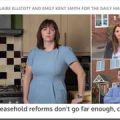 Questions must now be asked of housebuilders playing the leasehold game by building leasehold houses wherever possible in preference to freehold.
Questions must now be asked of housebuilders playing the leasehold game by building leasehold houses wherever possible in preference to freehold.
Some of the country’s biggest housebuilders – such as Persimmon and Bellway – are involved in the racket.
Politicians supposedly concerned with issues of leasehold should be questioning this matter.
Indeed, Persimmon should be under further scrutiny for holding its freeholds in offshore companies – the easier to flog off to anonymous entities and avoid the leaseholders’ right of first refusal.
Earlier this month Daily Mail financial reporter Ruth Lythe told how families in Cramlington, in Northumberland, now cannot sell their houses as their leases fall below 80 years.
£13,000 fees are required to extend the leases from the freeholders, Bellway and Persimmon.
It would be the property industry’s dream to have every new home in the country built as leasehold.
And let’s not forget retirement housebuilders such as McCarthy and Stone with their 125-year leases … which they know pensioners do not extend and therefore boost the freehold’s value.
Personal finance commentator Sam Dunn writes that leasehold is ‘a lucrative way to stop people from buying their own home outright’.
He continues:
“Over the past few years, campaign groups have sprung up to try to fight for better rights for leaseholders.
They include Leasehold Knowledge Partnership, the Campaign Against Retirement Leasehold Exploitation and – more radically – the Campaign for the Abolition of Residential Leasehold.“But our postbag continues to overflow with letters from leaseholders telling of terrible struggles with indifferent landlords. Incredibly, many new homes today are still being built in this way.
“In May, we revealed how thousands of houses – many of which are being targeted at first-time buyers – are being sold as leasehold by property firms. “And the numbers are rising, too.
“Investment companies are driving huge demand for these types of homes as they have seen it as a way to make a profit from the annual rents the buyers are made to pay. With so much at stake, I’d argue it’s time for a major review of leaseholds and their long-term impact on households …
“Given the heady mix of property ownership, house prices and matters of wealth involved, perhaps the Government would like to take up the cudgels.”





 New partnership JFM Management joins LKP
New partnership JFM Management joins LKP





















The sale of a leasehold flat that has 70 years of lease left ( those built in 1986) which over a 99 year lease is not much less than a third of the period.
The fact that they still have 70 years of lease left and that you have to be 60 years (young) to purchase, means that 70 years for a resident of 60 they would have to be 130, they could be homeless as the flat would be returned to the freeholder who at Ashbrook Court purchased 29 flats sold by the original freeholder for less than £34,000 for 29 flats?
Each flat was sold for less than £1,115, as we couldn’t get the 51% to show interest in the purchase which leaves one in a state of shock?
My flat had a 99 year lease beginning March 1969 three years before the flat was built. I purchased the lease for £10000 as the marriage value has kicked in. I could have bought the lease outside of the Act, but that would have resulted in a huge ground rent which would have cost a serious amount of money each year with it increasing every 10years. Unfortunately there is no guarantee that extending the lease will protect the value, as many of the surrounding flats were owned by elderly people (who had downsized) and hadn’t or didn’t realise the implications of not extending . As a result the flats have gone to auction and have been bought by investors, as banks and building societies are unwilling to grants mortgages on shorter leases, unlike London where property even with short leases can still command high prices, this is not the case in the North East. If the government is serious about tackling the housing shortage and trying to persuade older people to downsize then they need to tackle the leasehold issue, so that people who move into flats can protect their asset. I wouldn’t sell a freehold house to risk losing my hard earned cash in a property thats value would decline, particularly in the retirement sector.. There are many perfectly decent properties that no one wants to buy, and that no one can sell due to this ridiculous form of tenure.